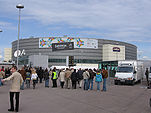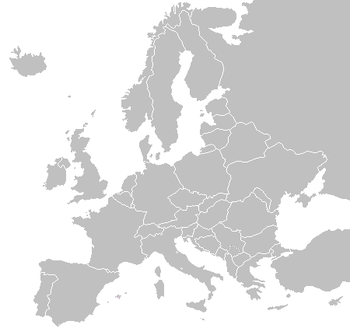- Portal:Eurovision
-
- Wikipedia portals:
- Culture
- Geography
- Health
- History
- Mathematics
- Natural sciences
- People
- Philosophy
- Religion
- Society
- Technology
The Eurovision Song Contest Portal
The Eurovision Song Contest is an annual competition held between active member countries of the European Broadcasting Union (EBU), in which participating countries each submit a song to be performed on live television; then proceed to cast votes for the other countries' songs, in order to find the most popular song in the competition. Each country participates via one of their national EBU-member television stations, whose task it is to select a singer and a song to go forward to represent the country in the international competition.
The Contest has been broadcast every year since its inauguration in 1956, and is one of the longest-running television programmes in the world. It is also the world's biggest song contest in terms of audience figures, which in recent years have been quoted as anything between 100 million and 600 million internationally. It has been broadcast around the globe — beyond Europe — to such countries as Australia, Canada, Chile, Egypt, Jordan, Hong Kong, India, Korea, New Zealand and the USA; even though these countries do not participate. Since the year 2000, the Contest has also been broadcast over the Internet; with more than 74,000 people in almost 140 countries having watched the 2006 edition online. The Contest is historically known for being mainly a bastion of formulaic, orchestrated pop music. However it has produced a vast, diverse array of songs, including such musical genres as Arabic, Balkan, Dance, Folk, Greek, Latin, Metal, Nordic, Pop-rap and Rock.
Selected article
Melodifestivalen is an annual music competition organised by Sveriges Television and Sveriges Radio to determine the song and artist that will represent Sweden at the Eurovision Song Contest. It has been staged under various formats almost every year since the first public competition in 1959. The competition is a considerably popular live television and radio event—it is the most popular television programme in Sweden, a title it has held since 2000, at times eclipsing even Eurovision itself. In 2007, an estimated four million people—almost 44% of Sweden's population—watched the final, while the semifinals averaged around 3.1 million viewers. The winner is chosen by a number of regional juries and a national televote. Until 2001 the competition was normally limited to between eight and twelve songs, but since the introduction of semifinals in 2002 that number has risen to thirty-two. The event is often seen as being dominated by light orchestrated pop songs, known locally as schlager music—so much so that it is sometimes referred to as Schlagerfestivalen by the Swedish media—but other styles of music such as rap, reggae and glam rock have made an appearance since the competition's expansion.
Selected picture
Photo credit: Sakis Rouvas
Greek singer born in Corfu Sakis Rouvas will represent Greece in the Eurovision Song Contest 2009.Countries in the Eurovision Song Contest
Liech.WikiProjects
Things you can do
Create: Ivan & Delfin · Schmetterlinge · Geraldine Brannigan
Expand: Izhar Cohen · The KMG's · Niamh Kavanagh · Jill Johnson · Amina Annabi · Henri DèsRelated portals
Eurovision Song Contest news
- 23 February 2008: 8 Countries in the Eurovision Song Contest 2008 choose their song through TV selection processes. (eurovision.tv)
- 21 February 2008: Talks are made in a decision to move the Eurovision Song Contest 2008 to another city due to the aftermath of the independence of Kosovo. However, these plans were dropped and RTS will gain a guarantee of safety and security from the government of Serbia for all visitors and participants of the contest. (ESCtoday.com)
- 16 October 2007: Tose Proeski, who represented the Republic of Macedonia at the 2004 Eurovision Song Contest, dies after a car accident in Croatia. (ESCtoday.com)
- 15 October 2007: Azerbaijan member channel iTV has now announced that they will be making their debut in Belgrade next year. (ESCtoday.com)
- 28 September 2007: The EBU confirm the use of two semi-finals at the 2008 Eurovision Song Contest. (ESCtoday.com)
- July 4 2007: Despite withdrawal rumours, Israel report their partipication in the Eurovision Song Contest 2008. (ESCtoday.com)
Did you know...
...that the 1974 Carnation Revolution in Portugal began when their entry E depois do adeus was broadcast on Portuguese radio?
...that the original concept for the Contest was based on the Italian Sanremo Music Festival?
...that the United Kingdom has finished second in the Contest fifteen times?
...that Lys Assia, winner of the first Eurovision Song Contest in 1956, also represented Switzerland at the Contest in 1957 and 1958?
...that in 2008, 43 countries took part at the event (new entries were San Marino and Azerbaijan)?
Eurovision Song Contest events
Eurovision Song Contest 1956 · 1957 · 1958 · 1959 · 1960 · 1961 · 1962 · 1963 · 1964 · 1965
1966 · 1967 · 1968 · 1969 · 1970 · 1971 · 1972 · 1973 · 1974 · 1975
1976 · 1977 · 1978 · 1979 · 1980 · 1981 · 1982 · 1983 · 1984 · 1985
1986 · 1987 · 1988 · 1989 · 1990 · 1991 · 1992 · 1993 · 1994 · 1995
1996 · 1997 · 1998 · 1999 · 2000 · 2001 · 2002 · 2003 · 2004 · 2005
2006 · 2007 · 2008 · 2009 · 2010 · 2011Junior Eurovision Song Contest
2003 · 2004 · 2005 · 2006 · 2007 · 2008 · 2009 · 2010 · 2011
National selections:Festivali I Këngës

Land of Fire
Eurosong
Eurofest
Eurosong
Dora
Dansk Melodi Grand Prix
Eesti Laul
Euroviisut
Söngvakeppni Sjónvarpsins
Eurosong
Kdam
 Skopje Fest
Skopje Fest
 Malta Song for Europe
Malta Song for Europe
 MontenegroSong
MontenegroSong
 Melodi Grand Prix
Melodi Grand Prix
 Festival da Canção
Festival da Canção
 Selecţia Naţională
Selecţia Naţională
 Beovizija
Beovizija
 Eurosong
Eurosong
 EMA
EMA
 ¡Tu país te necesita!
¡Tu país te necesita!
 Melodifestivalen
Melodifestivalen
 Your Country Needs You
Your Country Needs YouCategories
[×] OGAEAssociated Wikimedia
Categories:- Eurovision Song Contest
- Music portals
Wikimedia Foundation. 2010.








